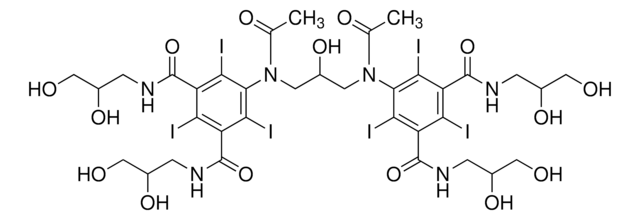88440
Poly(éthylène glycol)
BioUltra, 200
Synonyme(s) :
PEG
About This Item
Produits recommandés
Niveau de qualité
Gamme de produits
BioUltra
Forme
liquid
Poids mol.
Mr 190-210
Impuretés
insoluble matter:, passes filter test
≤0.02% peroxides (as H2O2):
Indice de réfraction
n20/D 1.460
pH
5.5-7.0 (25 °C, 50 mg/mL in H2O)
Solubilité
H2O: 50 mg/mL at 25 °C, clear, colorless
Densité
1.124 g/mL at 20 °C
Traces d'anions
chloride (Cl-): ≤50 mg/kg
sulfate (SO42-): ≤50 mg/kg
Traces de cations
Al: ≤5 mg/kg
As: ≤0.1 mg/kg
Ba: ≤5 mg/kg
Bi: ≤5 mg/kg
Ca: ≤10 mg/kg
Cd: ≤5 mg/kg
Co: ≤5 mg/kg
Cr: ≤5 mg/kg
Cu: ≤5 mg/kg
Fe: ≤5 mg/kg
K: ≤500 mg/kg
Li: ≤5 mg/kg
Mg: ≤5 mg/kg
Mn: ≤5 mg/kg
Mo: ≤5 mg/kg
Na: ≤200 mg/kg
Ni: ≤5 mg/kg
Pb: ≤5 mg/kg
Sr: ≤5 mg/kg
Zn: ≤5 mg/kg
λ
50 mg/mL in H2O
Absorption UV
λ: 260 nm Amax: 0.06
λ: 280 nm Amax: 0.03
Chaîne SMILES
C(CO)O
InChI
1S/C2H6O2/c3-1-2-4/h3-4H,1-2H2
Clé InChI
LYCAIKOWRPUZTN-UHFFFAOYSA-N
Vous recherchez des produits similaires ? Visite Guide de comparaison des produits
Description générale
Application
Vous ne trouvez pas le bon produit ?
Essayez notre Outil de sélection de produits.
Code de la classe de stockage
10 - Combustible liquids
Classe de danger pour l'eau (WGK)
WGK 1
Point d'éclair (°F)
519.8 °F - closed cup
Point d'éclair (°C)
271.00 °C - closed cup
Équipement de protection individuelle
Eyeshields, Gloves
Faites votre choix parmi les versions les plus récentes :
Déjà en possession de ce produit ?
Retrouvez la documentation relative aux produits que vous avez récemment achetés dans la Bibliothèque de documents.
Les clients ont également consulté
Notre équipe de scientifiques dispose d'une expérience dans tous les secteurs de la recherche, notamment en sciences de la vie, science des matériaux, synthèse chimique, chromatographie, analyse et dans de nombreux autres domaines..
Contacter notre Service technique




